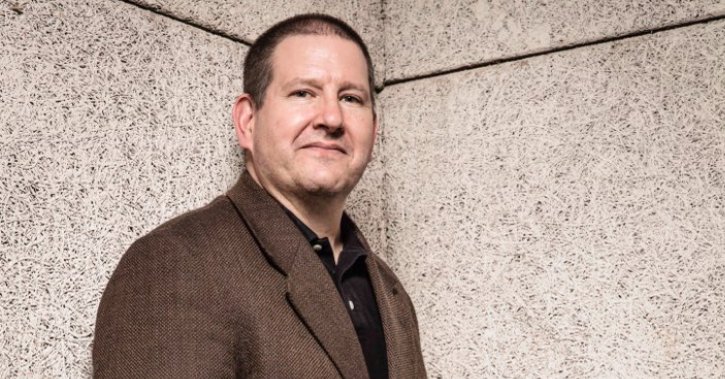Just like riding a bike: How one professor hopped back on the trumpet
Just like riding a bike: How one professor hopped back on the trumpet

Is there anything you do consistently every day? Maybe a morning cup of coffee or reading the newspaper? For Rowan University Music Professor Bryan Appleby-Wineberg, it’s playing the trumpet.
That is, until the day he physically couldn’t play.
“It was so weird. In my entire life, that was the longest I’d gone without playing,” Appleby-Wineberg said of the five weeks in late Fall 2020 where he couldn’t play. He noted he packs a pocket trumpet when he travels. He even took it on his honeymoon. “It’s a constant.”
In November 2020, Appleby-Wineberg, an avid cyclist, was out for his morning ride on the 6.5 mile path between Glassboro and Williamstown when a stick got lodged in the bike’s fender, halting the wheel and hurling him over the handlebars. His head and face broke the fall and scraped along the ground. He felt like his bottom lip was gone. He knew things were broken.
“I was in shock,” he recalls, “I remember thinking ‘what on earth just happened’.”
After reaching his wife Sarah, his next call was to College of Performing Arts Dean Rick Dammers to secure coverage for the student recitals scheduled for later that day. He also let Dammers know he wasn’t sure if he’d be able to play again. “It was scary. I had a hard time understanding him,” said Dean Dammers of the phone call. “I was able to make out ‘may not be able to play again’ and I assumed the worst.”
The prognosis? A broken nose, a fractured cheekbone, stitches in the lip and hand and an order for rest. No trumpet.
No trumpet for a few weeks may sound like a nice break; not for Appleby-Wineberg. He is the Head of Brass at Rowan, conductor of the Rowan Brass Band and Atlantic Youth Brass Band and member of the faculty Brass Ensemble. He is principal trumpet for the Bay-Atlantic Symphony and principal cornet and assistant conductor of the Atlantic Brass Band. He is a founding member of the professional trumpet ensemble “Tromba Mundi,” a founding member of the World Trumpet Federation, and co-host of “The Open Bell” podcast for, you guessed it, trumpet players. Needless to say, that five weeks felt like an eternity to someone like Appleby-Wineberg.
From age 10, Appleby-Wineberg had a passion for music, always knowing he wanted to be a hybrid instructor-player. In more than 20 years at Rowan University and as the only full-time classical trumpet professor in the state, he ironically developed a reputation as a “face fixer.” Beginning with their first lesson (or in some cases, as early as their audition), Appleby-Winberg works with his students to adjust and refine their embouchure, the way the muscles work to support the trumpet’s mouthpiece. According to the professor, if the technique isn’t there, a musician can do everything right and still struggle to play.
And so, after the accident the face fixer set out to fix his face—literally and musically.
Appleby-Wineberg connected with friend and Troy State University trombone professor Dr. Jason Sulliman. With a Doctor of Music in Brass Pedagogy and experience in kinesiology, Sulliman helped him develop a rehab practice plan focused on stability training, designed to work the muscles in a specific and controlled way to address weaknesses and make playing easier.
In getting back into the then virtual classroom, he was open with his students. “I warned them that I would look terrible and I wouldn’t be able to play any notes,” he recalled. And yet, despite Appleby-Wineberg’s apprehension, his rehabilitation had the opposite effect on his students.
“I think most of us thought we’d just give up if we were in his shoes,” said Music Education major Luke Hershman, who started lessons with Appleby-Wineberg before the accident. “But he was so hopeful for the future and always looking ahead.”
The experience forced him to abandon his old way of playing and Appleby-Wineberg began documenting his practice sessions on social media with daily videos. The intimate look into the frustrating and often tedious process showed his followers—and, more importantly, his students—how long it takes to make a change and how small steps make a big difference.
“To see a trumpet professor and a professional player willingly sharing that vulnerability is really honorable,” Hershman added. “That’s why he’s such a great teacher. He’s willing to make mistakes just as much as we are.”
By effectively starting from scratch, Appleby-Wineberg became a model for his students, mastering techniques and playing notes he hadn’t played before his accident. Through the meticulous training, his muscles became more efficient and his articulation and speed got faster, his playing cleaner. Back on the trumpet, his playing has even worn down the scarring, leaving little physical evidence the accident ever happened.
“From the outside, music looks like magic,” says Appleby-Wineberg with a laugh. “But really countless hours are spent being terrible and working hard to be a little less terrible than the day before.”
Appleby-Wineberg will take the stage again at Rowan this spring for a recital. His bike has since been repaired and he continues to go for daily rides, after which he hops back on his trumpet.